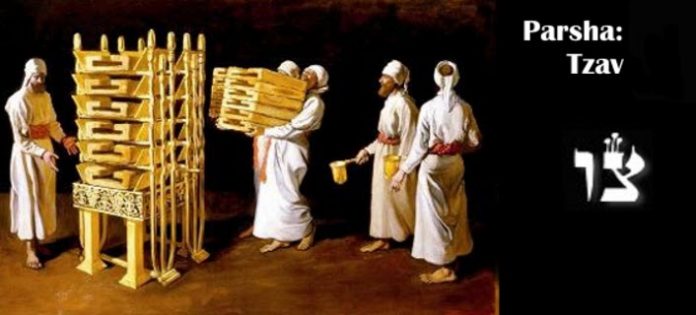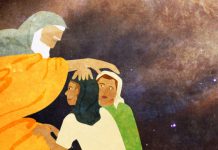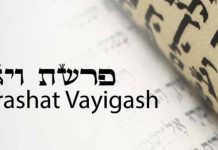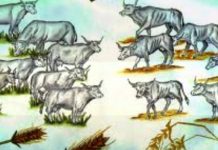In this Torah portion, God continues to describe the different laws of sacrifices. A distinction is made between sin offerings, burnt offerings, and homage offerings, with each following its own process. God then commands the priests to make another offering that ordains themselves in their positions.
God spoke to Moses, saying: Command Aaron and his sons to do the following rituals.
This is the ritual of the burnt offering. The burnt offering shall remain burning upon the altar all night until morning. Every morning the priest shall feed wood to it, lay out the burnt offering on it and turn the fat into smoke. A perpetual fire shall be kept burning on the altar for the fire is not to go out.
The ritual of the homage offering is out of respect to God. A handful of choice flour, oil and incense shall be mixed and a token portion shall be turned into smoke on the altar as a pleasing odor to the Lord. What is left of it shall be eaten by Aaron and his sons as unleavened cakes in the sacred space of the Tent of Meeting. It shall not be baked with leaven.
The offering of anointment is to give everlasting tribute to God. Like the homage offering, take some choice flour, but this time prepare it with oil in a pan. It shall go entirely up in smoke. It must be burned in its entirety. It must not be eaten.
The sin offering which clears one who sins is a holy of holies. The place where the ascent offering is slaughtered for God shall also be the place where the sin offering is slaughtered. The priest, who offers this sin offering, shall eat it in the sacred enclosure of the Tent of Appointed Meeting.
A Holy of Holies
The ritual of the guilt offering is a holy of holies. The guilt offering shall be slaughtered at the same spot as the burnt offering. Its blood shall be dashed on all sides of the altar and its fat shall be turned by the priests into smoke as an offering by fire to the Lord. Every male among the priests shall eat of it.
A ritual sacrifice of well-being may be offered to the Lord. There are rules for whether or not you may eat it and exactly how it is to be prepared. If it is offered for thanksgiving, it shall be an offering with unleavened bread, along with loaves of leavened bread.
Meat that touches anything unclean shall not be eaten. It shall be consumed in fire. You shall not eat fat of ox or sheep or goat. Fat from animals that died or were torn by beasts may be put to any use except as food. You must not eat it. You must not eat any blood, of either fowl or animal, in any of your settlements.
Then the Lord spoke to Moses, saying: Tell the Israelite people that offerings must be presented by one’s own hands. These offerings are to be given to anointed priests who will enact these offerings by fire.
These are the rituals of the burnt offering, the homage offering, the sin offering, the guilt offering, the offering of ordination, and the sacrifices of well-being with which the Lord charged Moses on Mount Sinai, when God commanded that the Israelites present their offerings to the Lord, in the wilderness of Sinai.
Then God told Moses to assemble Aaron and his sons and the whole community at the entrance of the Tent of Meeting. Aaron and his sons washed thoroughly then dressed with all the priestly vestments. Moses took the anointed oil and anointed the Tabernacle and all that was within it. He dedicated it to the Lord.
A bull was then sacrificed as a sin offering. A ram was sacrificed as a burnt offering. A second ram, the ram of ordination, was sacrificed as an offering by fire before the Lord. Then Moses consecrated Aaron and his sons and their vestments in order to dedicate them to the service of the Lord.
Then Moses told Aaron and his sons to cook the meat at the entrance of the Tent of Appointed Meeting and eat the bread in the basket of ordination. They should burn whatever flesh and bread is left in the fire. They must not remove themselves from the entrance of the Tent of Appointed Meeting, day or night, for seven days until the ordination is complete.
Aaron and his sons carried out all the utterances that God had commanded through Moses.
Parashat Tzav: Discussion Questions
1) What makes an offering to God holy?
2) Why must an offering be presented “by one’s own hand?”
3) Why do you think there are sacrifices made to God for peace and well-being? What kind of rituals do you do to show God your peace and well-being?
Reprinted with permission from Jewish Family & Life!
credit to myjewishlearning.com












